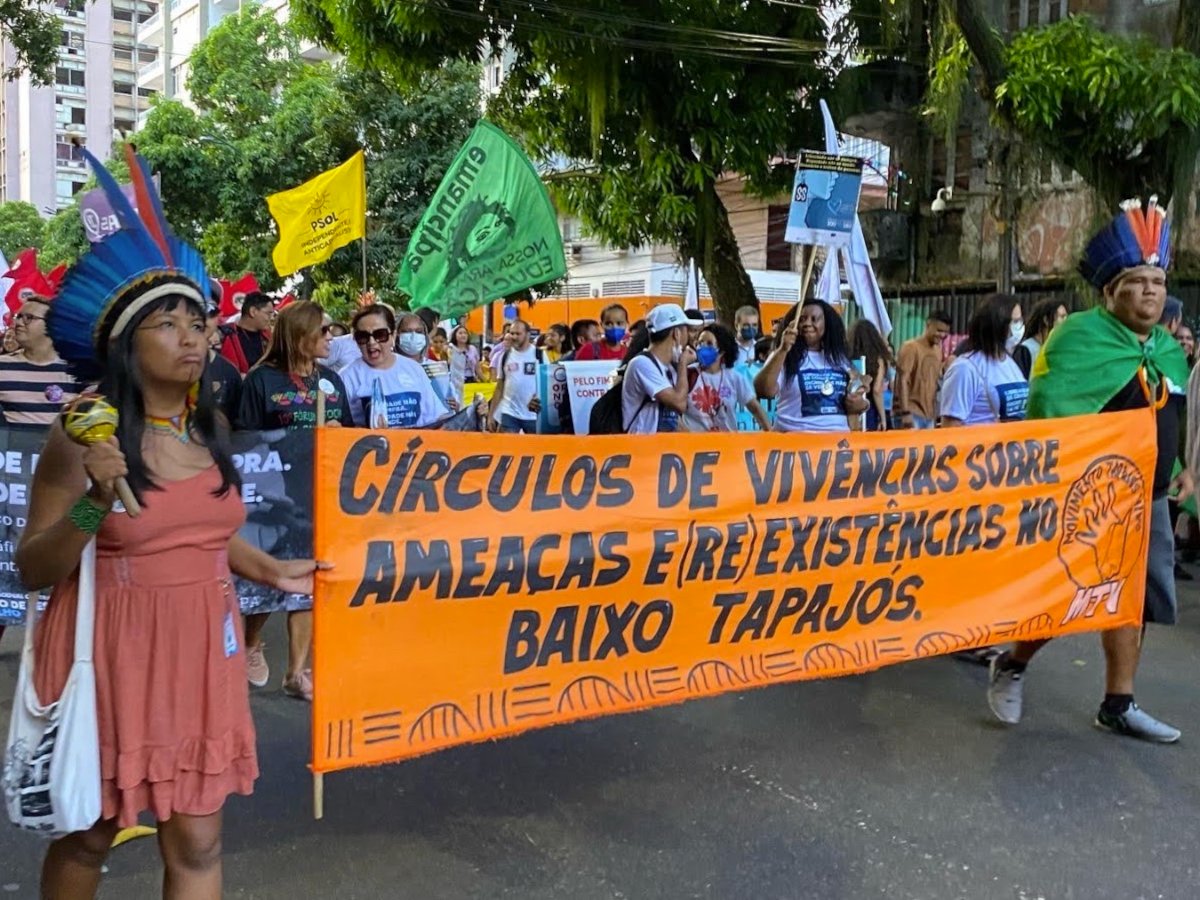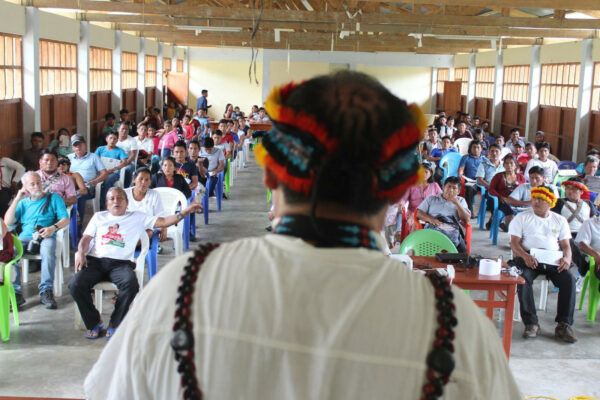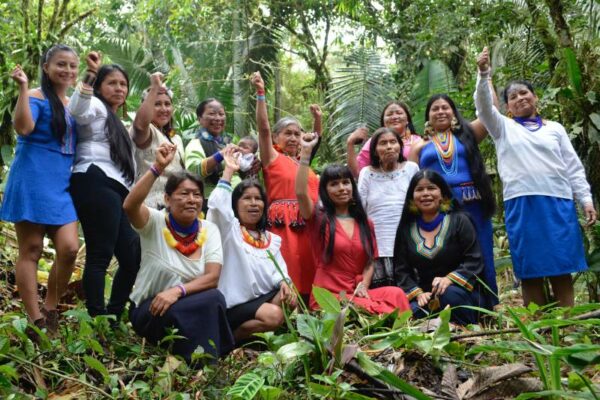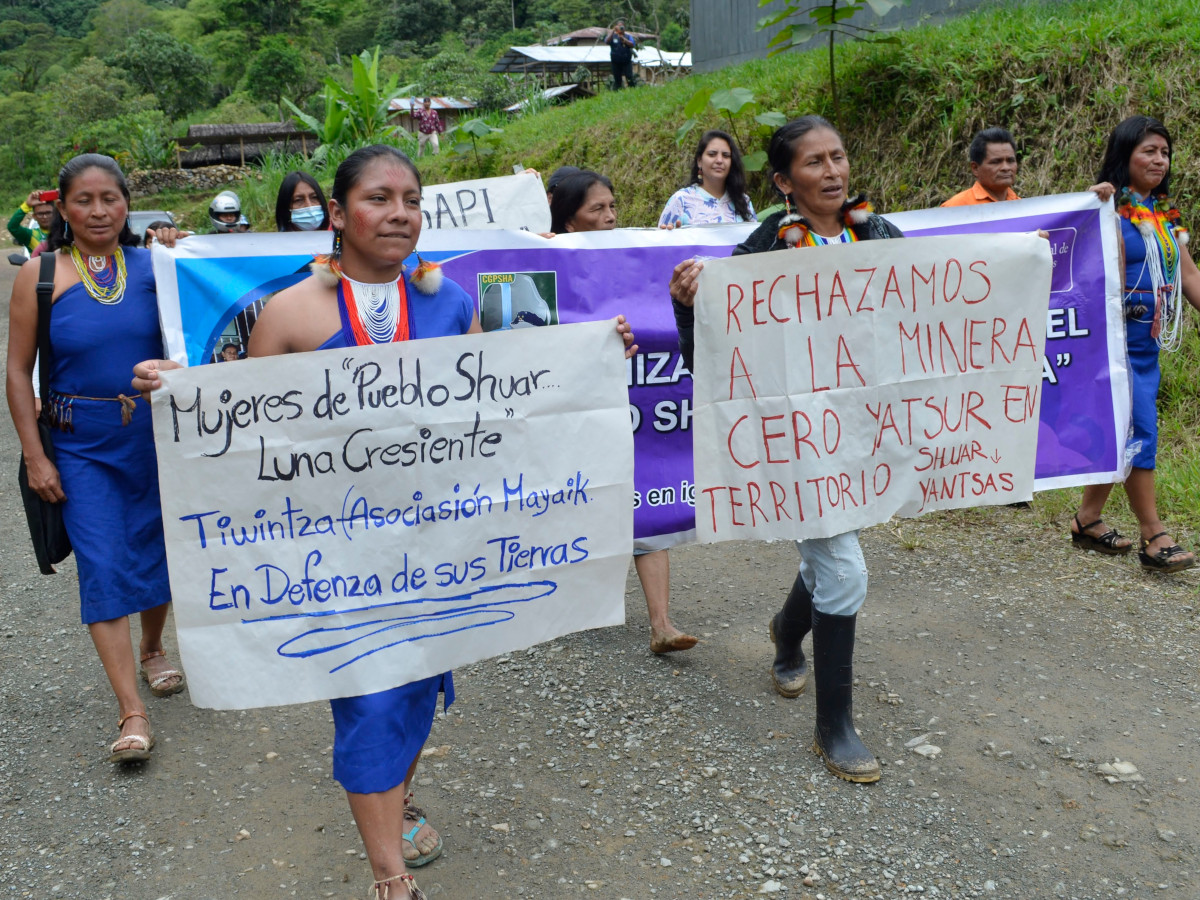The 10th edition of the Pan-Amazon Social Forum (X FOSPA) took place from July 28 to 31, in Belém, Pará, in Brazil. The meeting brought together traditional peoples and communities from the countryside, the cities, and the Amazon rainforest. People from all nine countries of the region were in attendance: Brazil, Peru, Ecuador, Colombia, Venezuela, Bolivia, Suriname, Guyana, and French Guiana. Amazon Watch was present at this historic meeting, represented by Brazil’s Legal Advisor Ana Carolina Alfinito and myself, Gabriela Sarmet, Brazil Campaign Advisor.
The X FOSPA was marked by a strong denunciation of the advances of the so-called development paradigm, in which governments and large corporations align themselves in complicity in destruction by approving projects that privatize profits and socialize losses over Amazonian peoples and territories, as Amazon Watch has denounced for some time.
Violence against community leaders, the stagnant demarcation of Indigenous territories, support for illegal extractivism, and other violations of rights are reproduced – in different rhythms and dimensions – throughout the Amazon rainforest. FOSPA, therefore, functioned as a geopolitical space where the priorities in the discussions were set by the very peoples affected by these policies of destruction, marking a strong protagonism of the historical resistances of traditional peoples and communities.
In the discussions, the urgency of a commitment to a radical transformation of the political, economic, and social structures surrounding the Amazon became evident, particularly with regard to decision-making.
As a space to share knowledge, the exchange promoted during the four days of FOSPA reiterated the infeasibility of the current predatory development model, which reinforces colonial practices and thoughts such as the inseparable relationship between nature and human exploitation – in particular of racialized subjects such as Indigenous peoples, riverbank communities, and quilombolas.
Amazon Watch representatives participated in tables and activities about mining and its socio-environmental impacts. In addition, we supported FEPIPA’s (Federation of Indigenous Peoples of Pará) campaign, which successfully collected 420 signatures from 255 organizations.
Amazon Watch’s Legal Advisor Ana Carolina Alfinito also accompanied the International Tribunal for the Rights of Nature during its in situ visit to the Carajás Territory. At FOSPA, international judges who are part of this tribunal released a partial report on human rights violations and violations against nature in the Amazon. The data in the report were collected by the delegation of judges from Brazil, South Africa, Ecuador, Peru, and the United States during visits that took place in the cities of Altamira, Anapu, Marabá, Parauapebas, and Canaã dos Carajás, all of which have a history of physical and symbolic violence caused by hydroelectric dams, agrarian conflicts, mining, and agribusiness. Alfinito gave a strong speech summarizing the Court’s remarks on the subject on July 29.
According to the community leaders present who shared their experiences, Carajás opened the way for other megaprojects to be constructed in the Amazon. For all these reasons, one of the verdicts of the Tribunal was the demand for a specific session on Belo Sun to alert not only the investors of the mining company about the systematic violation of rights that has occurred in the region, but also as a way to make the entire Canadian population aware of their country’s plans in Amazonian territory.
Alfinito made it clear that they act as facilitators and translators, but that the real judges are, in fact, the peoples and communities that keep the forest standing. She also pointed out that the term “affected” is insufficient to describe what these populations have been going through with the advance of mining companies and other megaprojects: it is destruction, a declaration of war, it is ecocide. “The extractive logic of mining leads to multiple forms of violence, and it doesn’t want anything to exist outside of it. It’s as if everything there is possessed by mining,” she said about the Carajás territory.
Another event that included Amazon Watch’s participation was “Mining Against Territories in the Amazon: violations, reparations, and resistance,” organized by the National Committee in Defense of Territories in the Face of Mining (CMD). One of the highlights of this panel was the constant comparison of the current situation in the Amazon with the history of the state of Minas Gerais – a state strongly marked by mining disasters (Brumadinho and Mariana). One of the fronts today is the initiative “Territories Free of Mining,” where the necessity of this activity, forged during the pandemic, is now being harshly questioned. Mining for what? For whom? And how? These were the central points discussed.
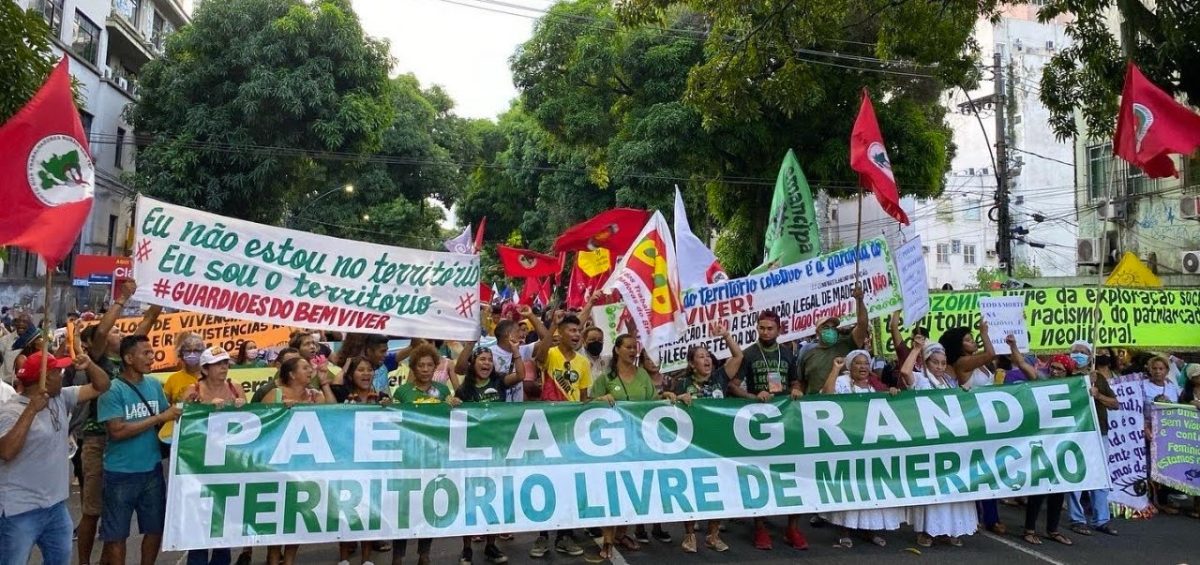
We cannot silently watch an ecocide take place, as has been happening in the Amazon and other Brazilian biomes. It is necessary to completely restructure our justice systems to promote restorative and regenerative justice, and no longer a punitive one. It is possible to restructure our way of thinking and doing politics to change the cycle of predatory extractivism that for centuries has been advancing over the Amazon.
The judicialization of cases related to the Rights of Nature in Brazil, as is already happening in neighboring countries, can be decisive for the reconstruction of the country that has suffered from the dismantling of environmental policies and systematic violations of the rights of traditional peoples and communities who act as guardians of the forests, rivers, and mountains.
Scientists have been warning us that we must protect the Amazon rainforest, its people, and the communities that keep it standing. As we face the climate emergency, this task is more important than ever to ultimately ensure human survival on the planet. For this, we need to go beyond solidarity and start thinking in terms of reciprocity. This means that we need to collectively act to protect nature and all its beings to ensure our own survival as a species.
It is by overcoming the colonial separation between human beings and nature that we will build an alternate world, where human rights are respected and nature is protected.


